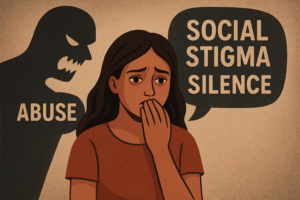
Domestic abuse is a grave issue that affects countless women across India. Despite the legal frameworks in place, many women still face violence and emotional manipulation in their homes. The Bharatiya Nyaya Sanhita (BNS) is designed to address such issues, and Sections 85 and 86 are particularly significant in providing recourse for women enduring domestic abuse.
Sections 85 and 86 of the Bharatiya Nyaya Sanhita (BNS)
Section 85 of the BNS deals with the offense of causing hurt with the intention to humiliate or injure a person. This section is crucial in cases of domestic abuse where physical harm is inflicted with malicious intent. Under this section, any act of violence aimed at causing bodily pain or injury is a punishable offense, regardless of the extent of the injury.
Section 86 of the BNS extends this protection by addressing cases of mental cruelty and harassment. Emotional abuse, coercion, and repeated insults meant to demean or control a person fall under the ambit of this section. While physical abuse often leaves visible marks, emotional abuse can be equally, if not more, damaging, and Section 86 recognizes the seriousness of such acts.
Shalini, a 32-year-old teacher, had been married for six years when the abuse from her husband began. At first, it was emotional manipulation—constant criticism, controlling behavior, and verbal insults designed to lower her self-esteem. Over time, the abuse escalated into physical violence. Her husband would push her during arguments, slap her in moments of rage, and threaten her if she ever spoke about it to someone that he would leave her.
Shalini’s situation became unbearable when her husband’s abuse left her with visible bruises, and the emotional toll had her questioning her own worth. “It wasn’t just the pain from the hitting; it was the constant feeling of being demeaned, like I didn’t matter. I was scared, but I didn’t know where to turn.”
Legal Recourse Under Sections 85 and 86 BNS
When Shalini decided she could no longer endure the abuse, she sought legal advice. She was informed about Sections 85 and 86 of the Bharatiya Nyaya Sanhita, which provided her with a clear path to justice.
Under Section 85, the physical assaults Shalini suffered were categorized as acts of causing hurt with the intent to humiliate and injure. Her husband’s violent behavior, aimed at controlling and punishing her, constituted a punishable offense under this section. The legal framework offered Shalini protection against such acts of violence and enabled her to file a formal complaint.
In addition, Section 86 addressed the emotional and mental abuse Shalini had been enduring for years. The verbal insults, manipulation, and coercion inflicted severe psychological harm, leaving her in constant fear and stress. Her husband’s intent was clear—to dominate and control her through emotional degradation.
The law enforcement officers took swift action, investigating her claims and collecting evidence to support her case. Medical reports of her injuries and witness testimonies from neighbors who had heard the fights further strengthened her position.
Once Shalini’s case was filed, several legal protections were put in place to ensure her safety. A protection order was issued, ensuring that her husband could not approach her or attempt to intimidate her while the case was ongoing. The law also safeguarded her right to privacy, ensuring that her personal details were kept confidential to prevent public scrutiny.
Shalini’s case proceeded swiftly, with both her physical injuries and mental distress being evaluated by experts. As the legal process unfolded, Shalini felt empowered knowing that the law was designed to protect women like her from both physical harm and emotional manipulation.
Landmark Cases that Shaped Sections 85 and 86
Several legal cases have shaped the application of Sections 85 and 86 of the BNS. One such case was Sudhir v. State of Maharashtra (2015), where the court ruled that persistent emotional abuse and threats constituted mental cruelty, even in the absence of physical violence. The case emphasized that emotional abuse can have lasting effects on a person’s well-being and should be taken as seriously as physical harm.
Another landmark case was Kamla Devi v. State of Haryana (2009), which focused on domestic violence and the intent to harm a woman’s dignity. In this case, the court upheld that acts of emotional degradation, when combined with physical abuse, warrant severe punishment under both sections of the law.
If you or someone you know is enduring domestic abuse, whether physical, emotional, or both, Sections 85 and 86 of the Bharatiya Nyaya Sanhita are there to offer legal recourse and protection. It is essential to break the silence, seek support, and take action to protect yourself.
At our law firm, we are committed to helping survivors navigate the legal system with compassion and care.


